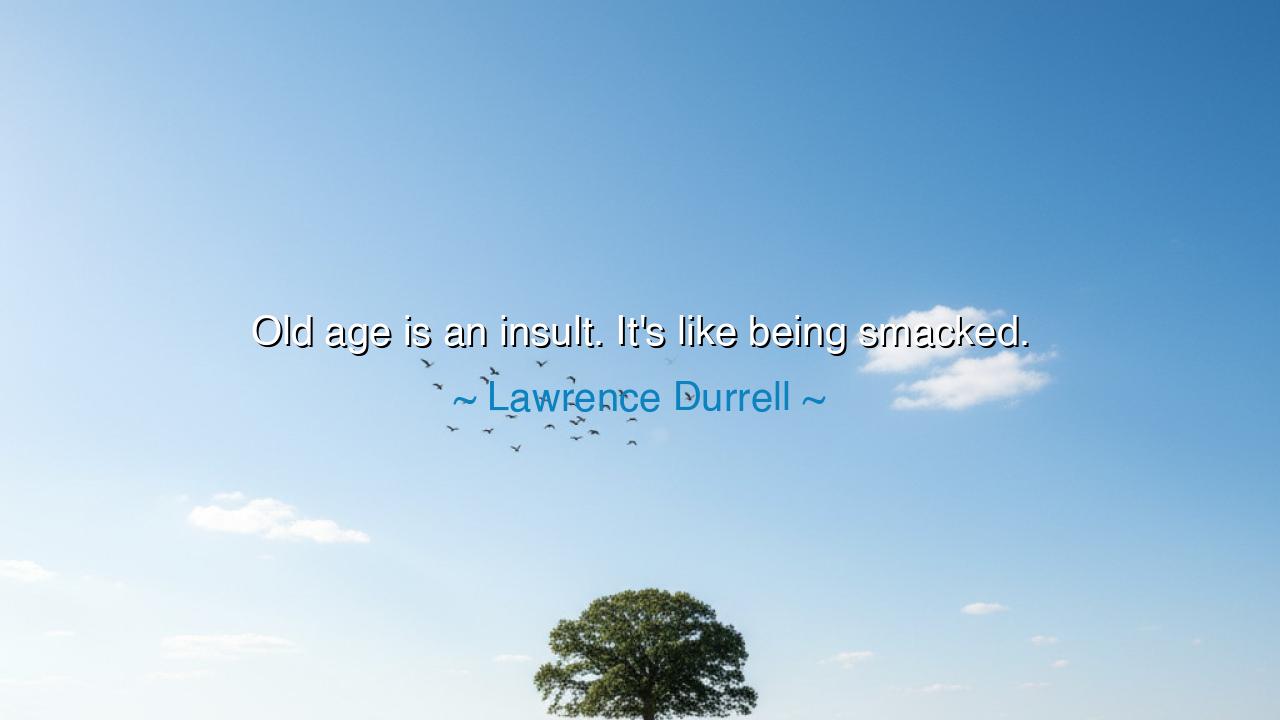
Old age is an insult. It's like being smacked.






When Lawrence Durrell, the great novelist and poet of the human condition, declared, “Old age is an insult. It’s like being smacked,” he spoke not from bitterness but from astonishment — the astonishment of one who had lived fully, loved deeply, and still could not believe that the body, that faithful vessel of the soul, would one day betray him. His words are not the complaint of the weak, but the lament of the wise. Beneath their sharpness lies the ache of realization: that no matter how brilliant the mind, no matter how vivid the heart, time remains undefeated. Old age arrives not gently, but like a blow, reminding us that even the most radiant flame must one day dim.
Durrell’s imagery — “like being smacked” — captures the suddenness and humiliation of that truth. It is not a slow fading that wounds him, but the shock of awareness, the moment when one looks in the mirror and sees that youth has vanished without permission. To call it an insult is to name the indignity of losing mastery over what once obeyed so effortlessly — the strength of the hand, the speed of the step, the clarity of thought. Yet, his words also carry a strange kind of humor, the dark laughter of one who recognizes the irony of existence: that we live long enough to outgrow the very vigor that once defined us. Old age, then, is life’s final jest — cruel, yes, but undeniably honest.
To understand Durrell’s sentiment, one must recall the man himself — the traveler, the lover, the writer of The Alexandria Quartet, whose prose danced between beauty and despair. He lived with the passion of one who believed art could capture eternity. But as his body aged, he confronted the truth that creation itself cannot protect the creator from decay. The very mind that crafted visions of immortal beauty was now housed in flesh that faltered. His cry that “old age is an insult” is the cry of an artist who could accept death but not diminishment — for death is final, but old age is a slow undoing, a long farewell to vitality.
This sense of betrayal is ancient. The philosopher Cicero, in his treatise On Old Age, admitted that aging strips away the pleasures of the senses, yet urged men to find dignity in wisdom. But not all shared his serenity. King Lear, in Shakespeare’s tragedy, found in his old age not peace but humiliation — cast aside by his daughters, mocked by the world he once ruled. His decline was not only physical but spiritual, and like Durrell, he felt that sting — that smack — of being rendered powerless. Old age, in such moments, feels not like nature’s rhythm but like punishment, a reminder that even kings and geniuses are bound to dust.
And yet, within Durrell’s lament lies a deeper truth — that the insult of age exists only because the soul refuses to accept limitation. The pain of aging is born from the memory of vitality, from the echo of what was once possible. The old feel “smacked” not because they are weak, but because they remember strength too vividly. This awareness, though cruel, is also sacred: it means the fire still burns. The insult of old age, therefore, is not death’s cruelty but life’s excess — the heart’s refusal to grow dull even as the body yields.
If we read his words through this lens, they become less a complaint and more a challenge. Durrell reminds us that while the flesh may weaken, the imagination remains immortal. To grow old with grace does not mean to deny the pain of decline, but to transmute it — to turn the “insult” into insight, the “smack” into awakening. The artist, the thinker, the soul that continues to feel indignation at aging has not been defeated; it has merely been reminded of its eternal nature. The body may bow, but the spirit, once aware of its own endurance, can rise higher than ever.
So, O listener, take this teaching to heart: do not let the insult of age rob you of its secret blessing. When time strikes, let it awaken reverence instead of resentment. Remember that the same force that erodes the body also refines the soul. Accept the blows, but let them forge you — like iron hammered into something everlasting. Speak, create, love, and burn, even when the body falters, for the fire within is untouched by years.
Thus, the teaching endures: old age is indeed a shock, a strike against pride — but it is also an invitation to transcendence. Lawrence Durrell’s lament is not the end of the story; it is the beginning of wisdom. For in the very moment when life seems to mock us, it also offers its final gift — the chance to see beyond flesh, beyond time, and into the eternal brilliance of the soul that no insult can diminish.






AAdministratorAdministrator
Welcome, honored guests. Please leave a comment, we will respond soon